Critical Analysis of Sustainable and Responsible Tourism Management
VerifiedAdded on 2023/06/11
|10
|3213
|84
Report
AI Summary
This report explores the concepts of sustainable and responsible management in tourism, emphasizing the importance of balancing economic growth with environmental and cultural preservation. It reviews literature on sustainable tourism practices, highlighting both the benefits and challenges of implementing such strategies in the tourism and hospitality sectors. The report analyzes how destinations and tourism organizations approach sustainability, with a focus on reducing carbon emissions, waste, and resource consumption. It also critically examines the practical application of sustainable principles, considering the economic implications and the need for stakeholder engagement. The case of Indonesia, particularly Bali, is used to illustrate the integration of sustainable practices in tourism management.
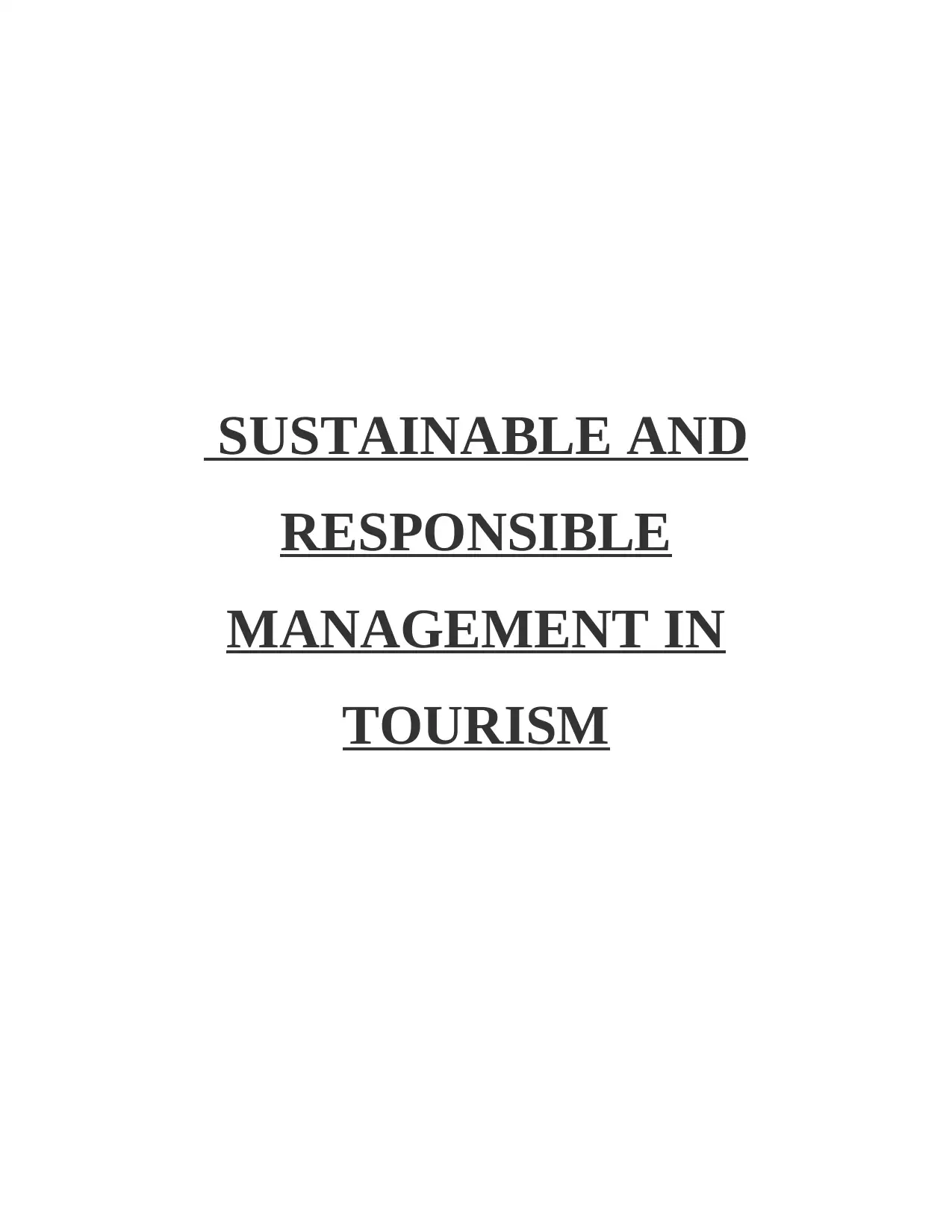
SUSTAINABLE AND
RESPONSIBLE
MANAGEMENT IN
TOURISM
RESPONSIBLE
MANAGEMENT IN
TOURISM
Paraphrase This Document
Need a fresh take? Get an instant paraphrase of this document with our AI Paraphraser
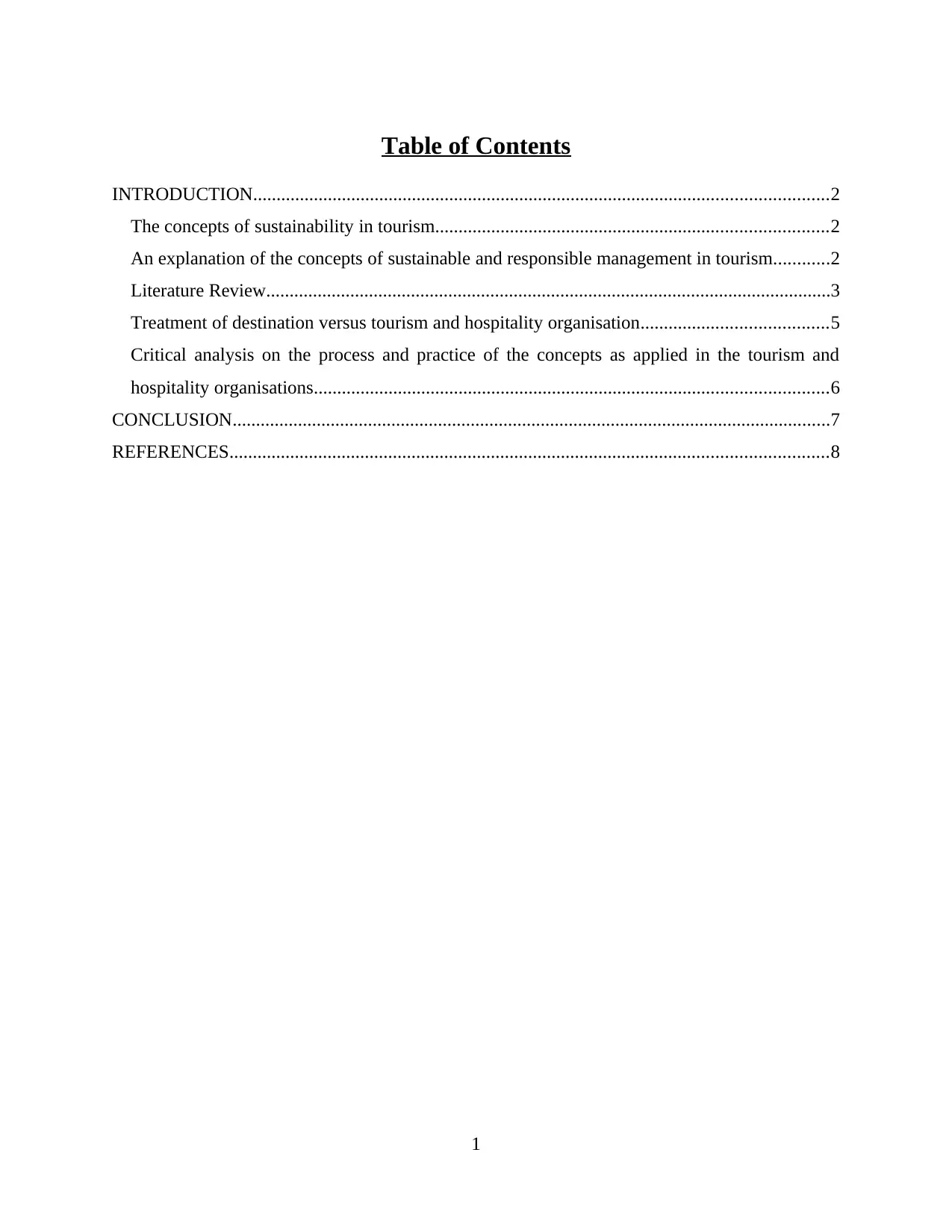
Table of Contents
INTRODUCTION...........................................................................................................................2
The concepts of sustainability in tourism....................................................................................2
An explanation of the concepts of sustainable and responsible management in tourism............2
Literature Review.........................................................................................................................3
Treatment of destination versus tourism and hospitality organisation........................................5
Critical analysis on the process and practice of the concepts as applied in the tourism and
hospitality organisations..............................................................................................................6
CONCLUSION................................................................................................................................7
REFERENCES................................................................................................................................8
1
INTRODUCTION...........................................................................................................................2
The concepts of sustainability in tourism....................................................................................2
An explanation of the concepts of sustainable and responsible management in tourism............2
Literature Review.........................................................................................................................3
Treatment of destination versus tourism and hospitality organisation........................................5
Critical analysis on the process and practice of the concepts as applied in the tourism and
hospitality organisations..............................................................................................................6
CONCLUSION................................................................................................................................7
REFERENCES................................................................................................................................8
1
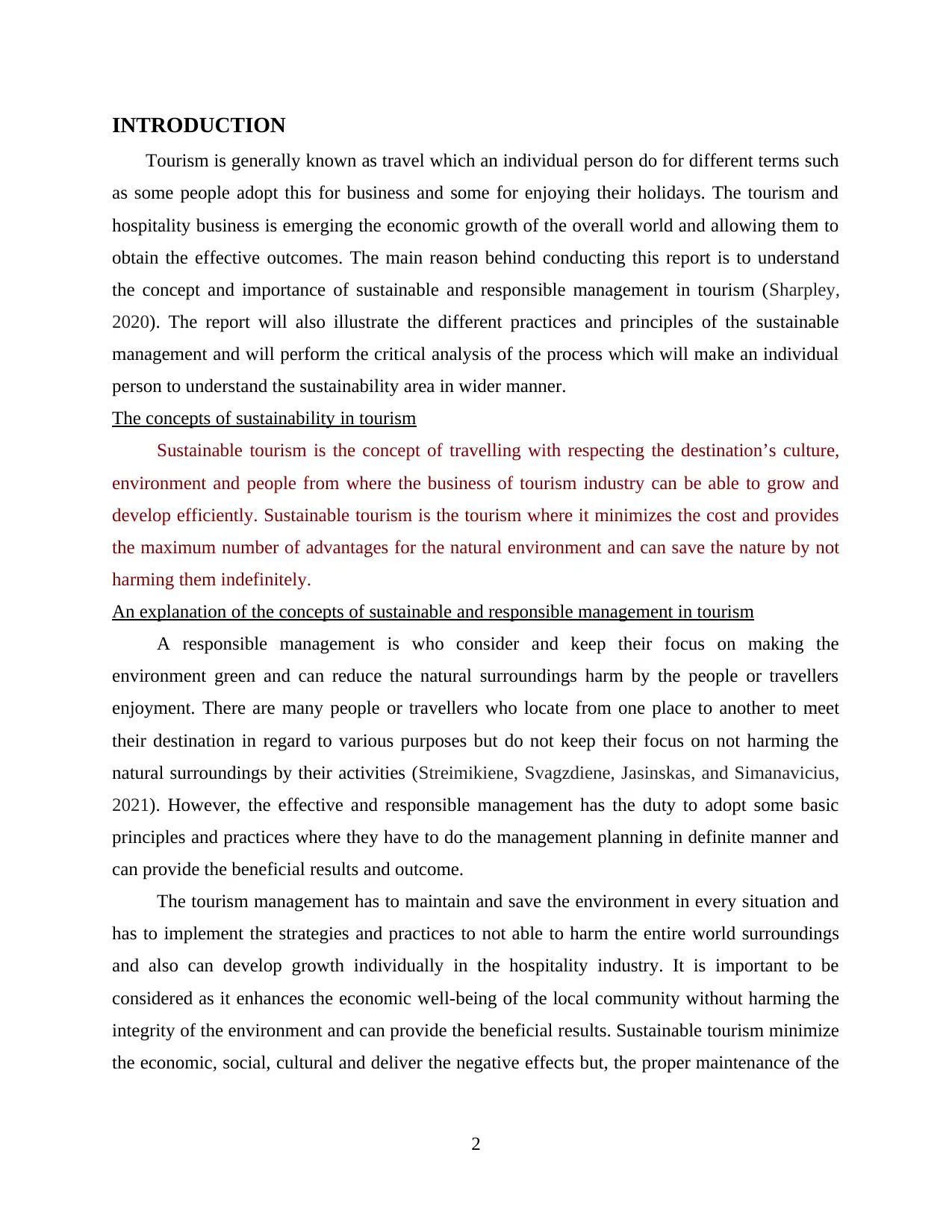
INTRODUCTION
Tourism is generally known as travel which an individual person do for different terms such
as some people adopt this for business and some for enjoying their holidays. The tourism and
hospitality business is emerging the economic growth of the overall world and allowing them to
obtain the effective outcomes. The main reason behind conducting this report is to understand
the concept and importance of sustainable and responsible management in tourism (Sharpley,
2020). The report will also illustrate the different practices and principles of the sustainable
management and will perform the critical analysis of the process which will make an individual
person to understand the sustainability area in wider manner.
The concepts of sustainability in tourism
Sustainable tourism is the concept of travelling with respecting the destination’s culture,
environment and people from where the business of tourism industry can be able to grow and
develop efficiently. Sustainable tourism is the tourism where it minimizes the cost and provides
the maximum number of advantages for the natural environment and can save the nature by not
harming them indefinitely.
An explanation of the concepts of sustainable and responsible management in tourism
A responsible management is who consider and keep their focus on making the
environment green and can reduce the natural surroundings harm by the people or travellers
enjoyment. There are many people or travellers who locate from one place to another to meet
their destination in regard to various purposes but do not keep their focus on not harming the
natural surroundings by their activities (Streimikiene, Svagzdiene, Jasinskas, and Simanavicius,
2021). However, the effective and responsible management has the duty to adopt some basic
principles and practices where they have to do the management planning in definite manner and
can provide the beneficial results and outcome.
The tourism management has to maintain and save the environment in every situation and
has to implement the strategies and practices to not able to harm the entire world surroundings
and also can develop growth individually in the hospitality industry. It is important to be
considered as it enhances the economic well-being of the local community without harming the
integrity of the environment and can provide the beneficial results. Sustainable tourism minimize
the economic, social, cultural and deliver the negative effects but, the proper maintenance of the
2
Tourism is generally known as travel which an individual person do for different terms such
as some people adopt this for business and some for enjoying their holidays. The tourism and
hospitality business is emerging the economic growth of the overall world and allowing them to
obtain the effective outcomes. The main reason behind conducting this report is to understand
the concept and importance of sustainable and responsible management in tourism (Sharpley,
2020). The report will also illustrate the different practices and principles of the sustainable
management and will perform the critical analysis of the process which will make an individual
person to understand the sustainability area in wider manner.
The concepts of sustainability in tourism
Sustainable tourism is the concept of travelling with respecting the destination’s culture,
environment and people from where the business of tourism industry can be able to grow and
develop efficiently. Sustainable tourism is the tourism where it minimizes the cost and provides
the maximum number of advantages for the natural environment and can save the nature by not
harming them indefinitely.
An explanation of the concepts of sustainable and responsible management in tourism
A responsible management is who consider and keep their focus on making the
environment green and can reduce the natural surroundings harm by the people or travellers
enjoyment. There are many people or travellers who locate from one place to another to meet
their destination in regard to various purposes but do not keep their focus on not harming the
natural surroundings by their activities (Streimikiene, Svagzdiene, Jasinskas, and Simanavicius,
2021). However, the effective and responsible management has the duty to adopt some basic
principles and practices where they have to do the management planning in definite manner and
can provide the beneficial results and outcome.
The tourism management has to maintain and save the environment in every situation and
has to implement the strategies and practices to not able to harm the entire world surroundings
and also can develop growth individually in the hospitality industry. It is important to be
considered as it enhances the economic well-being of the local community without harming the
integrity of the environment and can provide the beneficial results. Sustainable tourism minimize
the economic, social, cultural and deliver the negative effects but, the proper maintenance of the
2
⊘ This is a preview!⊘
Do you want full access?
Subscribe today to unlock all pages.

Trusted by 1+ million students worldwide
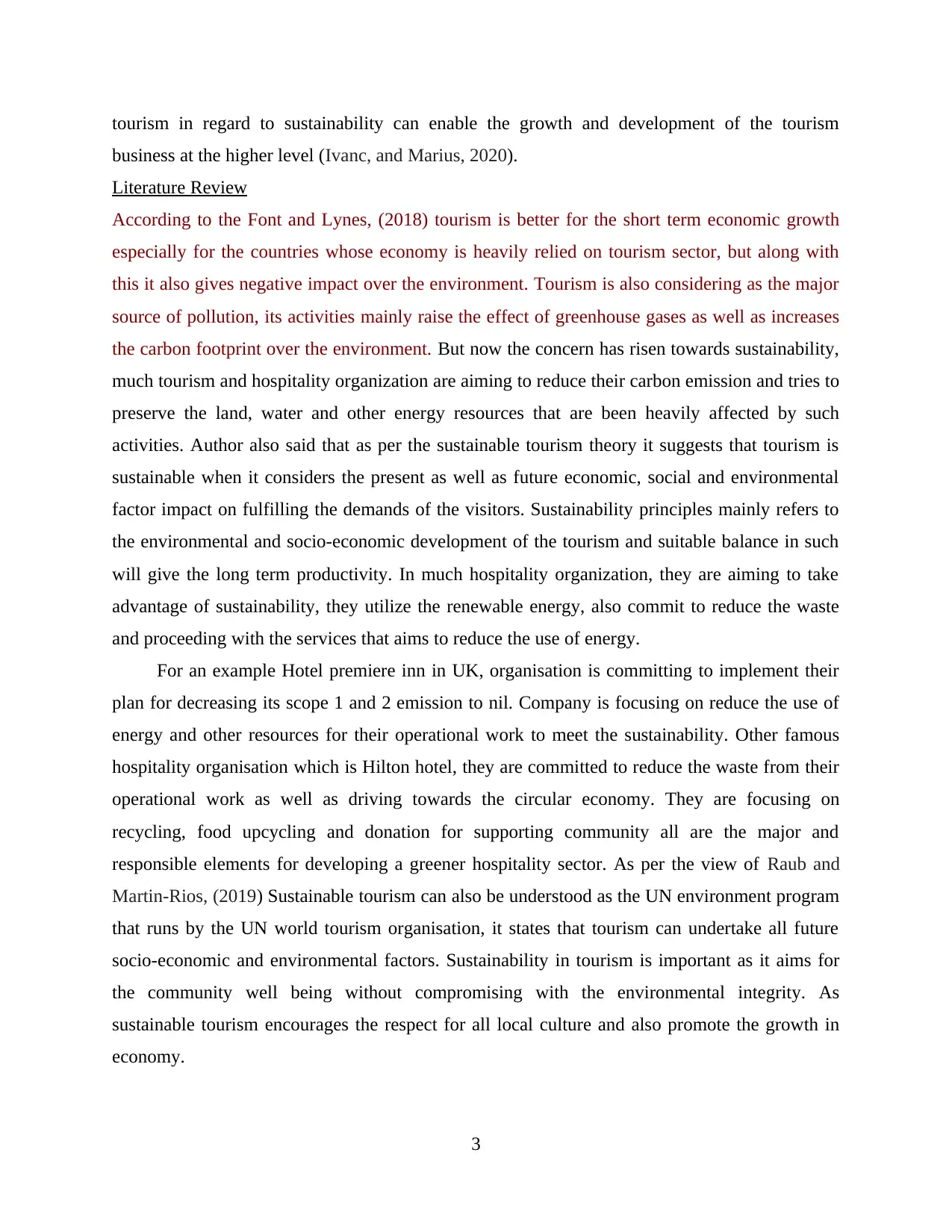
tourism in regard to sustainability can enable the growth and development of the tourism
business at the higher level (Ivanc, and Marius, 2020).
Literature Review
According to the Font and Lynes, (2018) tourism is better for the short term economic growth
especially for the countries whose economy is heavily relied on tourism sector, but along with
this it also gives negative impact over the environment. Tourism is also considering as the major
source of pollution, its activities mainly raise the effect of greenhouse gases as well as increases
the carbon footprint over the environment. But now the concern has risen towards sustainability,
much tourism and hospitality organization are aiming to reduce their carbon emission and tries to
preserve the land, water and other energy resources that are been heavily affected by such
activities. Author also said that as per the sustainable tourism theory it suggests that tourism is
sustainable when it considers the present as well as future economic, social and environmental
factor impact on fulfilling the demands of the visitors. Sustainability principles mainly refers to
the environmental and socio-economic development of the tourism and suitable balance in such
will give the long term productivity. In much hospitality organization, they are aiming to take
advantage of sustainability, they utilize the renewable energy, also commit to reduce the waste
and proceeding with the services that aims to reduce the use of energy.
For an example Hotel premiere inn in UK, organisation is committing to implement their
plan for decreasing its scope 1 and 2 emission to nil. Company is focusing on reduce the use of
energy and other resources for their operational work to meet the sustainability. Other famous
hospitality organisation which is Hilton hotel, they are committed to reduce the waste from their
operational work as well as driving towards the circular economy. They are focusing on
recycling, food upcycling and donation for supporting community all are the major and
responsible elements for developing a greener hospitality sector. As per the view of Raub and
Martin-Rios, (2019) Sustainable tourism can also be understood as the UN environment program
that runs by the UN world tourism organisation, it states that tourism can undertake all future
socio-economic and environmental factors. Sustainability in tourism is important as it aims for
the community well being without compromising with the environmental integrity. As
sustainable tourism encourages the respect for all local culture and also promote the growth in
economy.
3
business at the higher level (Ivanc, and Marius, 2020).
Literature Review
According to the Font and Lynes, (2018) tourism is better for the short term economic growth
especially for the countries whose economy is heavily relied on tourism sector, but along with
this it also gives negative impact over the environment. Tourism is also considering as the major
source of pollution, its activities mainly raise the effect of greenhouse gases as well as increases
the carbon footprint over the environment. But now the concern has risen towards sustainability,
much tourism and hospitality organization are aiming to reduce their carbon emission and tries to
preserve the land, water and other energy resources that are been heavily affected by such
activities. Author also said that as per the sustainable tourism theory it suggests that tourism is
sustainable when it considers the present as well as future economic, social and environmental
factor impact on fulfilling the demands of the visitors. Sustainability principles mainly refers to
the environmental and socio-economic development of the tourism and suitable balance in such
will give the long term productivity. In much hospitality organization, they are aiming to take
advantage of sustainability, they utilize the renewable energy, also commit to reduce the waste
and proceeding with the services that aims to reduce the use of energy.
For an example Hotel premiere inn in UK, organisation is committing to implement their
plan for decreasing its scope 1 and 2 emission to nil. Company is focusing on reduce the use of
energy and other resources for their operational work to meet the sustainability. Other famous
hospitality organisation which is Hilton hotel, they are committed to reduce the waste from their
operational work as well as driving towards the circular economy. They are focusing on
recycling, food upcycling and donation for supporting community all are the major and
responsible elements for developing a greener hospitality sector. As per the view of Raub and
Martin-Rios, (2019) Sustainable tourism can also be understood as the UN environment program
that runs by the UN world tourism organisation, it states that tourism can undertake all future
socio-economic and environmental factors. Sustainability in tourism is important as it aims for
the community well being without compromising with the environmental integrity. As
sustainable tourism encourages the respect for all local culture and also promote the growth in
economy.
3
Paraphrase This Document
Need a fresh take? Get an instant paraphrase of this document with our AI Paraphraser
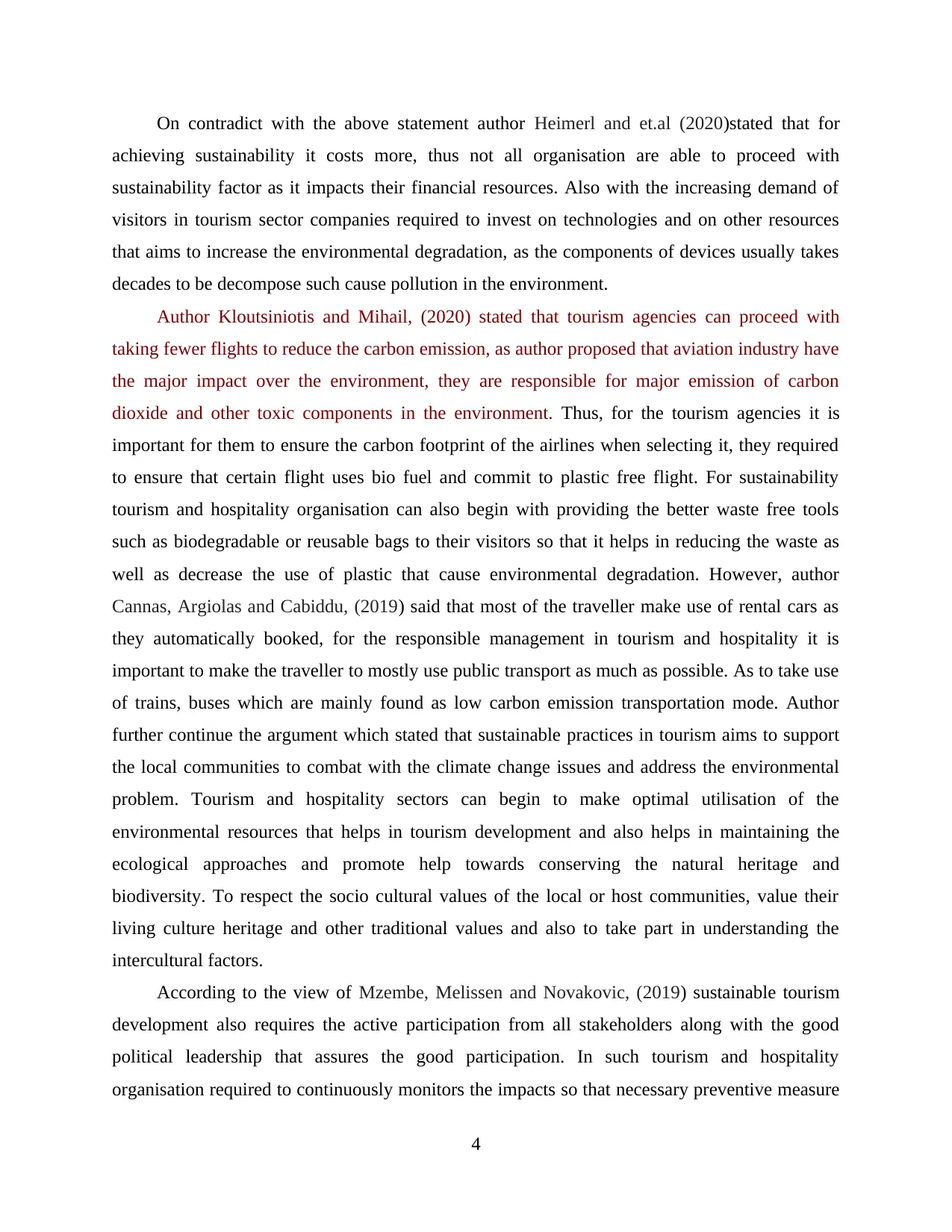
On contradict with the above statement author Heimerl and et.al (2020)stated that for
achieving sustainability it costs more, thus not all organisation are able to proceed with
sustainability factor as it impacts their financial resources. Also with the increasing demand of
visitors in tourism sector companies required to invest on technologies and on other resources
that aims to increase the environmental degradation, as the components of devices usually takes
decades to be decompose such cause pollution in the environment.
Author Kloutsiniotis and Mihail, (2020) stated that tourism agencies can proceed with
taking fewer flights to reduce the carbon emission, as author proposed that aviation industry have
the major impact over the environment, they are responsible for major emission of carbon
dioxide and other toxic components in the environment. Thus, for the tourism agencies it is
important for them to ensure the carbon footprint of the airlines when selecting it, they required
to ensure that certain flight uses bio fuel and commit to plastic free flight. For sustainability
tourism and hospitality organisation can also begin with providing the better waste free tools
such as biodegradable or reusable bags to their visitors so that it helps in reducing the waste as
well as decrease the use of plastic that cause environmental degradation. However, author
Cannas, Argiolas and Cabiddu, (2019) said that most of the traveller make use of rental cars as
they automatically booked, for the responsible management in tourism and hospitality it is
important to make the traveller to mostly use public transport as much as possible. As to take use
of trains, buses which are mainly found as low carbon emission transportation mode. Author
further continue the argument which stated that sustainable practices in tourism aims to support
the local communities to combat with the climate change issues and address the environmental
problem. Tourism and hospitality sectors can begin to make optimal utilisation of the
environmental resources that helps in tourism development and also helps in maintaining the
ecological approaches and promote help towards conserving the natural heritage and
biodiversity. To respect the socio cultural values of the local or host communities, value their
living culture heritage and other traditional values and also to take part in understanding the
intercultural factors.
According to the view of Mzembe, Melissen and Novakovic, (2019) sustainable tourism
development also requires the active participation from all stakeholders along with the good
political leadership that assures the good participation. In such tourism and hospitality
organisation required to continuously monitors the impacts so that necessary preventive measure
4
achieving sustainability it costs more, thus not all organisation are able to proceed with
sustainability factor as it impacts their financial resources. Also with the increasing demand of
visitors in tourism sector companies required to invest on technologies and on other resources
that aims to increase the environmental degradation, as the components of devices usually takes
decades to be decompose such cause pollution in the environment.
Author Kloutsiniotis and Mihail, (2020) stated that tourism agencies can proceed with
taking fewer flights to reduce the carbon emission, as author proposed that aviation industry have
the major impact over the environment, they are responsible for major emission of carbon
dioxide and other toxic components in the environment. Thus, for the tourism agencies it is
important for them to ensure the carbon footprint of the airlines when selecting it, they required
to ensure that certain flight uses bio fuel and commit to plastic free flight. For sustainability
tourism and hospitality organisation can also begin with providing the better waste free tools
such as biodegradable or reusable bags to their visitors so that it helps in reducing the waste as
well as decrease the use of plastic that cause environmental degradation. However, author
Cannas, Argiolas and Cabiddu, (2019) said that most of the traveller make use of rental cars as
they automatically booked, for the responsible management in tourism and hospitality it is
important to make the traveller to mostly use public transport as much as possible. As to take use
of trains, buses which are mainly found as low carbon emission transportation mode. Author
further continue the argument which stated that sustainable practices in tourism aims to support
the local communities to combat with the climate change issues and address the environmental
problem. Tourism and hospitality sectors can begin to make optimal utilisation of the
environmental resources that helps in tourism development and also helps in maintaining the
ecological approaches and promote help towards conserving the natural heritage and
biodiversity. To respect the socio cultural values of the local or host communities, value their
living culture heritage and other traditional values and also to take part in understanding the
intercultural factors.
According to the view of Mzembe, Melissen and Novakovic, (2019) sustainable tourism
development also requires the active participation from all stakeholders along with the good
political leadership that assures the good participation. In such tourism and hospitality
organisation required to continuously monitors the impacts so that necessary preventive measure
4
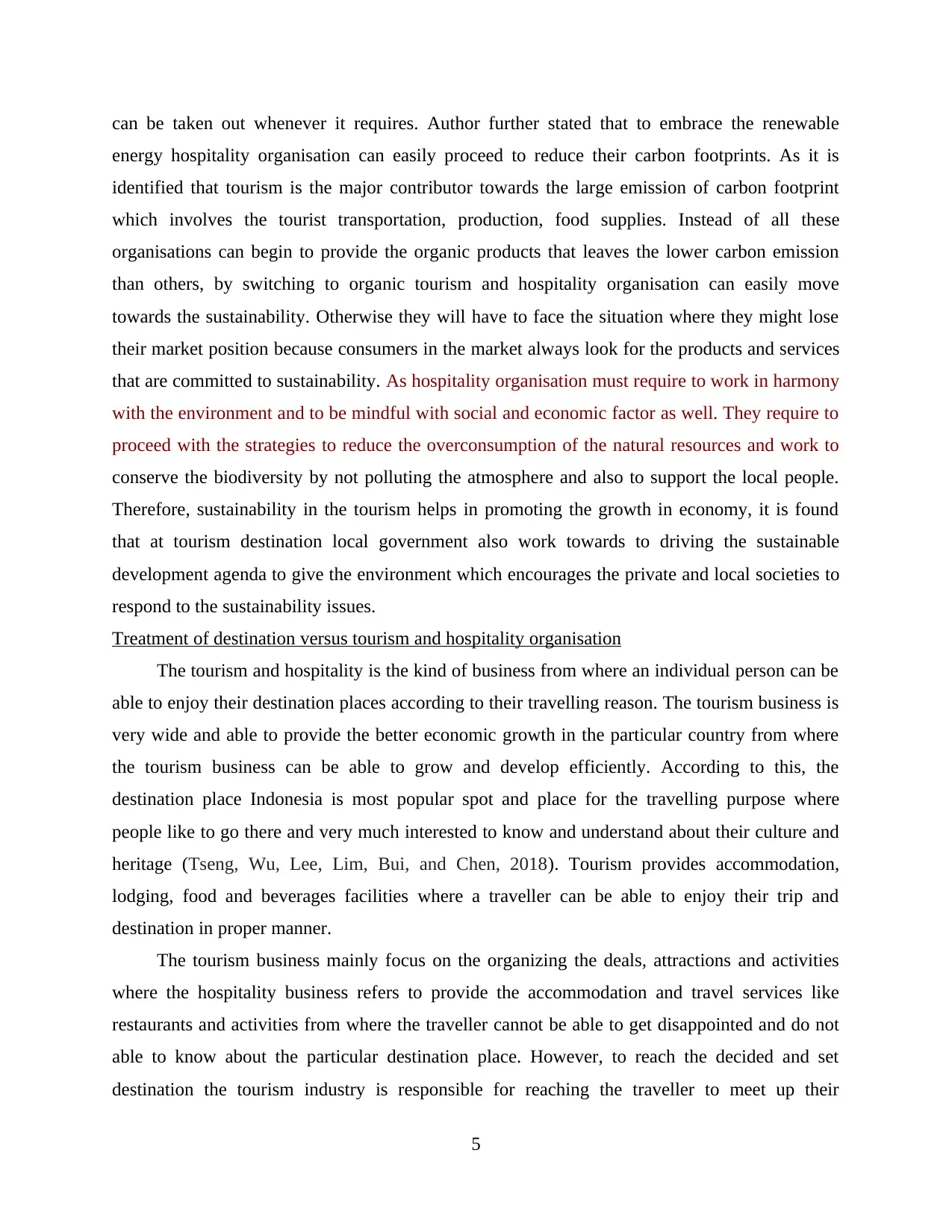
can be taken out whenever it requires. Author further stated that to embrace the renewable
energy hospitality organisation can easily proceed to reduce their carbon footprints. As it is
identified that tourism is the major contributor towards the large emission of carbon footprint
which involves the tourist transportation, production, food supplies. Instead of all these
organisations can begin to provide the organic products that leaves the lower carbon emission
than others, by switching to organic tourism and hospitality organisation can easily move
towards the sustainability. Otherwise they will have to face the situation where they might lose
their market position because consumers in the market always look for the products and services
that are committed to sustainability. As hospitality organisation must require to work in harmony
with the environment and to be mindful with social and economic factor as well. They require to
proceed with the strategies to reduce the overconsumption of the natural resources and work to
conserve the biodiversity by not polluting the atmosphere and also to support the local people.
Therefore, sustainability in the tourism helps in promoting the growth in economy, it is found
that at tourism destination local government also work towards to driving the sustainable
development agenda to give the environment which encourages the private and local societies to
respond to the sustainability issues.
Treatment of destination versus tourism and hospitality organisation
The tourism and hospitality is the kind of business from where an individual person can be
able to enjoy their destination places according to their travelling reason. The tourism business is
very wide and able to provide the better economic growth in the particular country from where
the tourism business can be able to grow and develop efficiently. According to this, the
destination place Indonesia is most popular spot and place for the travelling purpose where
people like to go there and very much interested to know and understand about their culture and
heritage (Tseng, Wu, Lee, Lim, Bui, and Chen, 2018). Tourism provides accommodation,
lodging, food and beverages facilities where a traveller can be able to enjoy their trip and
destination in proper manner.
The tourism business mainly focus on the organizing the deals, attractions and activities
where the hospitality business refers to provide the accommodation and travel services like
restaurants and activities from where the traveller cannot be able to get disappointed and do not
able to know about the particular destination place. However, to reach the decided and set
destination the tourism industry is responsible for reaching the traveller to meet up their
5
energy hospitality organisation can easily proceed to reduce their carbon footprints. As it is
identified that tourism is the major contributor towards the large emission of carbon footprint
which involves the tourist transportation, production, food supplies. Instead of all these
organisations can begin to provide the organic products that leaves the lower carbon emission
than others, by switching to organic tourism and hospitality organisation can easily move
towards the sustainability. Otherwise they will have to face the situation where they might lose
their market position because consumers in the market always look for the products and services
that are committed to sustainability. As hospitality organisation must require to work in harmony
with the environment and to be mindful with social and economic factor as well. They require to
proceed with the strategies to reduce the overconsumption of the natural resources and work to
conserve the biodiversity by not polluting the atmosphere and also to support the local people.
Therefore, sustainability in the tourism helps in promoting the growth in economy, it is found
that at tourism destination local government also work towards to driving the sustainable
development agenda to give the environment which encourages the private and local societies to
respond to the sustainability issues.
Treatment of destination versus tourism and hospitality organisation
The tourism and hospitality is the kind of business from where an individual person can be
able to enjoy their destination places according to their travelling reason. The tourism business is
very wide and able to provide the better economic growth in the particular country from where
the tourism business can be able to grow and develop efficiently. According to this, the
destination place Indonesia is most popular spot and place for the travelling purpose where
people like to go there and very much interested to know and understand about their culture and
heritage (Tseng, Wu, Lee, Lim, Bui, and Chen, 2018). Tourism provides accommodation,
lodging, food and beverages facilities where a traveller can be able to enjoy their trip and
destination in proper manner.
The tourism business mainly focus on the organizing the deals, attractions and activities
where the hospitality business refers to provide the accommodation and travel services like
restaurants and activities from where the traveller cannot be able to get disappointed and do not
able to know about the particular destination place. However, to reach the decided and set
destination the tourism industry is responsible for reaching the traveller to meet up their
5
⊘ This is a preview!⊘
Do you want full access?
Subscribe today to unlock all pages.

Trusted by 1+ million students worldwide
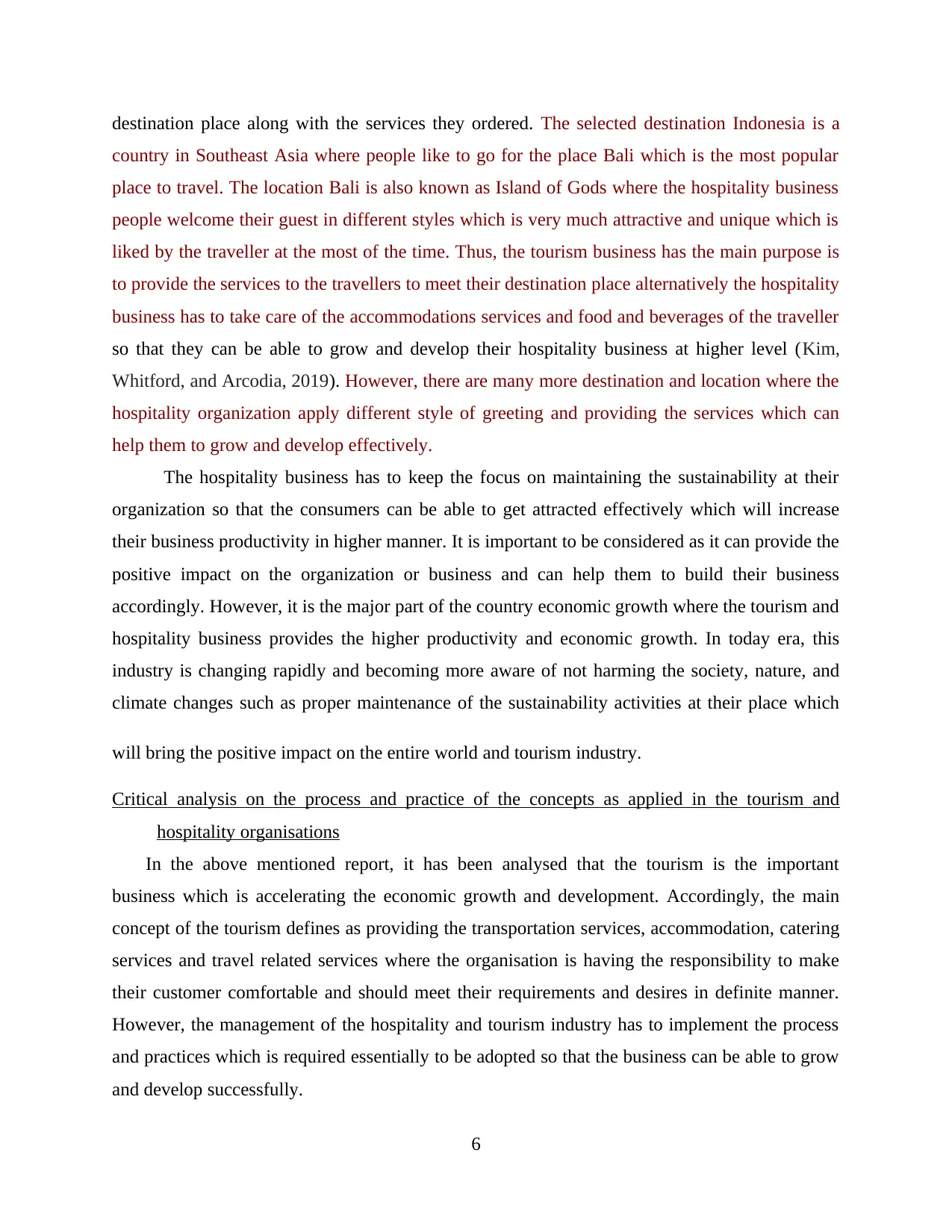
destination place along with the services they ordered. The selected destination Indonesia is a
country in Southeast Asia where people like to go for the place Bali which is the most popular
place to travel. The location Bali is also known as Island of Gods where the hospitality business
people welcome their guest in different styles which is very much attractive and unique which is
liked by the traveller at the most of the time. Thus, the tourism business has the main purpose is
to provide the services to the travellers to meet their destination place alternatively the hospitality
business has to take care of the accommodations services and food and beverages of the traveller
so that they can be able to grow and develop their hospitality business at higher level (Kim,
Whitford, and Arcodia, 2019). However, there are many more destination and location where the
hospitality organization apply different style of greeting and providing the services which can
help them to grow and develop effectively.
The hospitality business has to keep the focus on maintaining the sustainability at their
organization so that the consumers can be able to get attracted effectively which will increase
their business productivity in higher manner. It is important to be considered as it can provide the
positive impact on the organization or business and can help them to build their business
accordingly. However, it is the major part of the country economic growth where the tourism and
hospitality business provides the higher productivity and economic growth. In today era, this
industry is changing rapidly and becoming more aware of not harming the society, nature, and
climate changes such as proper maintenance of the sustainability activities at their place which
will bring the positive impact on the entire world and tourism industry.
Critical analysis on the process and practice of the concepts as applied in the tourism and
hospitality organisations
In the above mentioned report, it has been analysed that the tourism is the important
business which is accelerating the economic growth and development. Accordingly, the main
concept of the tourism defines as providing the transportation services, accommodation, catering
services and travel related services where the organisation is having the responsibility to make
their customer comfortable and should meet their requirements and desires in definite manner.
However, the management of the hospitality and tourism industry has to implement the process
and practices which is required essentially to be adopted so that the business can be able to grow
and develop successfully.
6
country in Southeast Asia where people like to go for the place Bali which is the most popular
place to travel. The location Bali is also known as Island of Gods where the hospitality business
people welcome their guest in different styles which is very much attractive and unique which is
liked by the traveller at the most of the time. Thus, the tourism business has the main purpose is
to provide the services to the travellers to meet their destination place alternatively the hospitality
business has to take care of the accommodations services and food and beverages of the traveller
so that they can be able to grow and develop their hospitality business at higher level (Kim,
Whitford, and Arcodia, 2019). However, there are many more destination and location where the
hospitality organization apply different style of greeting and providing the services which can
help them to grow and develop effectively.
The hospitality business has to keep the focus on maintaining the sustainability at their
organization so that the consumers can be able to get attracted effectively which will increase
their business productivity in higher manner. It is important to be considered as it can provide the
positive impact on the organization or business and can help them to build their business
accordingly. However, it is the major part of the country economic growth where the tourism and
hospitality business provides the higher productivity and economic growth. In today era, this
industry is changing rapidly and becoming more aware of not harming the society, nature, and
climate changes such as proper maintenance of the sustainability activities at their place which
will bring the positive impact on the entire world and tourism industry.
Critical analysis on the process and practice of the concepts as applied in the tourism and
hospitality organisations
In the above mentioned report, it has been analysed that the tourism is the important
business which is accelerating the economic growth and development. Accordingly, the main
concept of the tourism defines as providing the transportation services, accommodation, catering
services and travel related services where the organisation is having the responsibility to make
their customer comfortable and should meet their requirements and desires in definite manner.
However, the management of the hospitality and tourism industry has to implement the process
and practices which is required essentially to be adopted so that the business can be able to grow
and develop successfully.
6
Paraphrase This Document
Need a fresh take? Get an instant paraphrase of this document with our AI Paraphraser
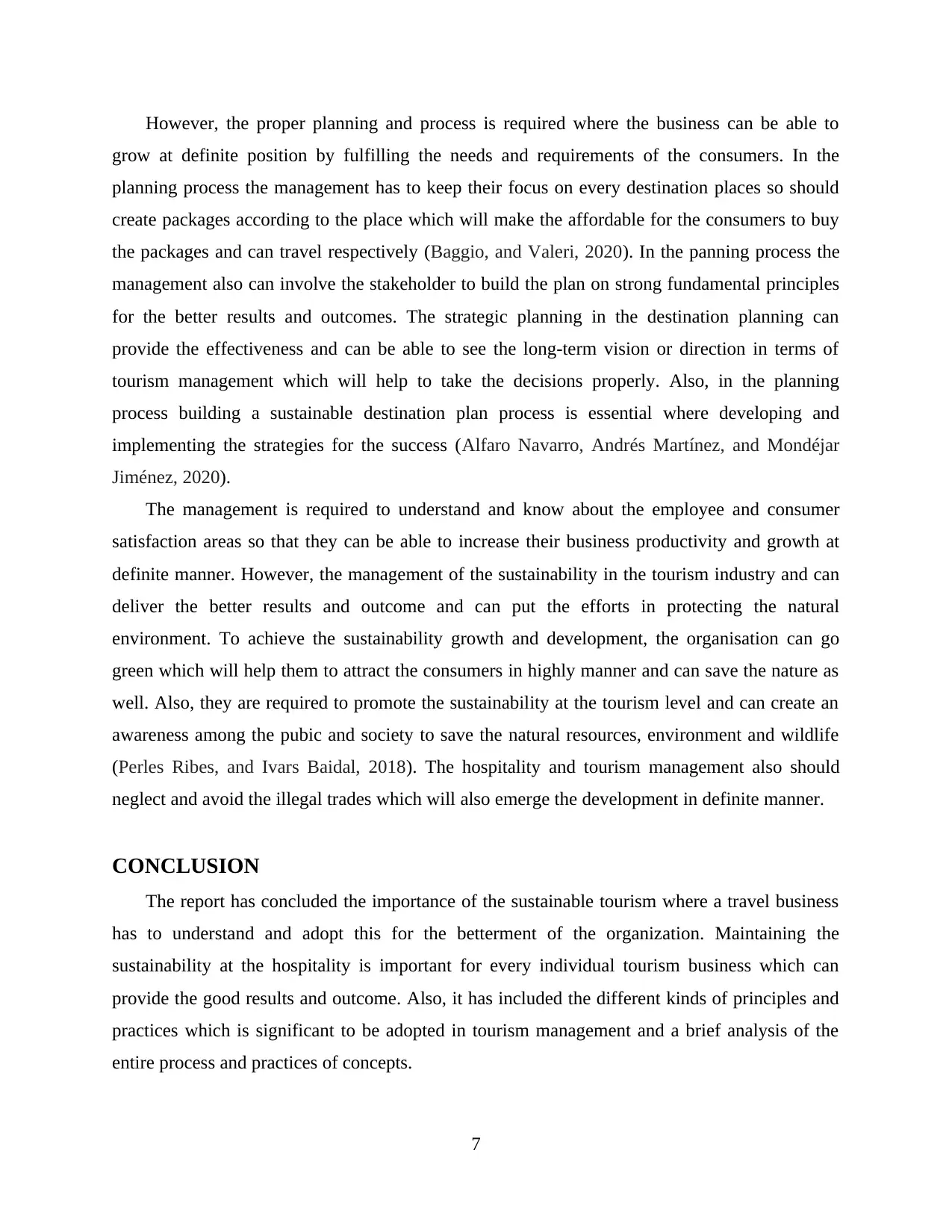
However, the proper planning and process is required where the business can be able to
grow at definite position by fulfilling the needs and requirements of the consumers. In the
planning process the management has to keep their focus on every destination places so should
create packages according to the place which will make the affordable for the consumers to buy
the packages and can travel respectively (Baggio, and Valeri, 2020). In the panning process the
management also can involve the stakeholder to build the plan on strong fundamental principles
for the better results and outcomes. The strategic planning in the destination planning can
provide the effectiveness and can be able to see the long-term vision or direction in terms of
tourism management which will help to take the decisions properly. Also, in the planning
process building a sustainable destination plan process is essential where developing and
implementing the strategies for the success (Alfaro Navarro, Andrés Martínez, and Mondéjar
Jiménez, 2020).
The management is required to understand and know about the employee and consumer
satisfaction areas so that they can be able to increase their business productivity and growth at
definite manner. However, the management of the sustainability in the tourism industry and can
deliver the better results and outcome and can put the efforts in protecting the natural
environment. To achieve the sustainability growth and development, the organisation can go
green which will help them to attract the consumers in highly manner and can save the nature as
well. Also, they are required to promote the sustainability at the tourism level and can create an
awareness among the pubic and society to save the natural resources, environment and wildlife
(Perles Ribes, and Ivars Baidal, 2018). The hospitality and tourism management also should
neglect and avoid the illegal trades which will also emerge the development in definite manner.
CONCLUSION
The report has concluded the importance of the sustainable tourism where a travel business
has to understand and adopt this for the betterment of the organization. Maintaining the
sustainability at the hospitality is important for every individual tourism business which can
provide the good results and outcome. Also, it has included the different kinds of principles and
practices which is significant to be adopted in tourism management and a brief analysis of the
entire process and practices of concepts.
7
grow at definite position by fulfilling the needs and requirements of the consumers. In the
planning process the management has to keep their focus on every destination places so should
create packages according to the place which will make the affordable for the consumers to buy
the packages and can travel respectively (Baggio, and Valeri, 2020). In the panning process the
management also can involve the stakeholder to build the plan on strong fundamental principles
for the better results and outcomes. The strategic planning in the destination planning can
provide the effectiveness and can be able to see the long-term vision or direction in terms of
tourism management which will help to take the decisions properly. Also, in the planning
process building a sustainable destination plan process is essential where developing and
implementing the strategies for the success (Alfaro Navarro, Andrés Martínez, and Mondéjar
Jiménez, 2020).
The management is required to understand and know about the employee and consumer
satisfaction areas so that they can be able to increase their business productivity and growth at
definite manner. However, the management of the sustainability in the tourism industry and can
deliver the better results and outcome and can put the efforts in protecting the natural
environment. To achieve the sustainability growth and development, the organisation can go
green which will help them to attract the consumers in highly manner and can save the nature as
well. Also, they are required to promote the sustainability at the tourism level and can create an
awareness among the pubic and society to save the natural resources, environment and wildlife
(Perles Ribes, and Ivars Baidal, 2018). The hospitality and tourism management also should
neglect and avoid the illegal trades which will also emerge the development in definite manner.
CONCLUSION
The report has concluded the importance of the sustainable tourism where a travel business
has to understand and adopt this for the betterment of the organization. Maintaining the
sustainability at the hospitality is important for every individual tourism business which can
provide the good results and outcome. Also, it has included the different kinds of principles and
practices which is significant to be adopted in tourism management and a brief analysis of the
entire process and practices of concepts.
7
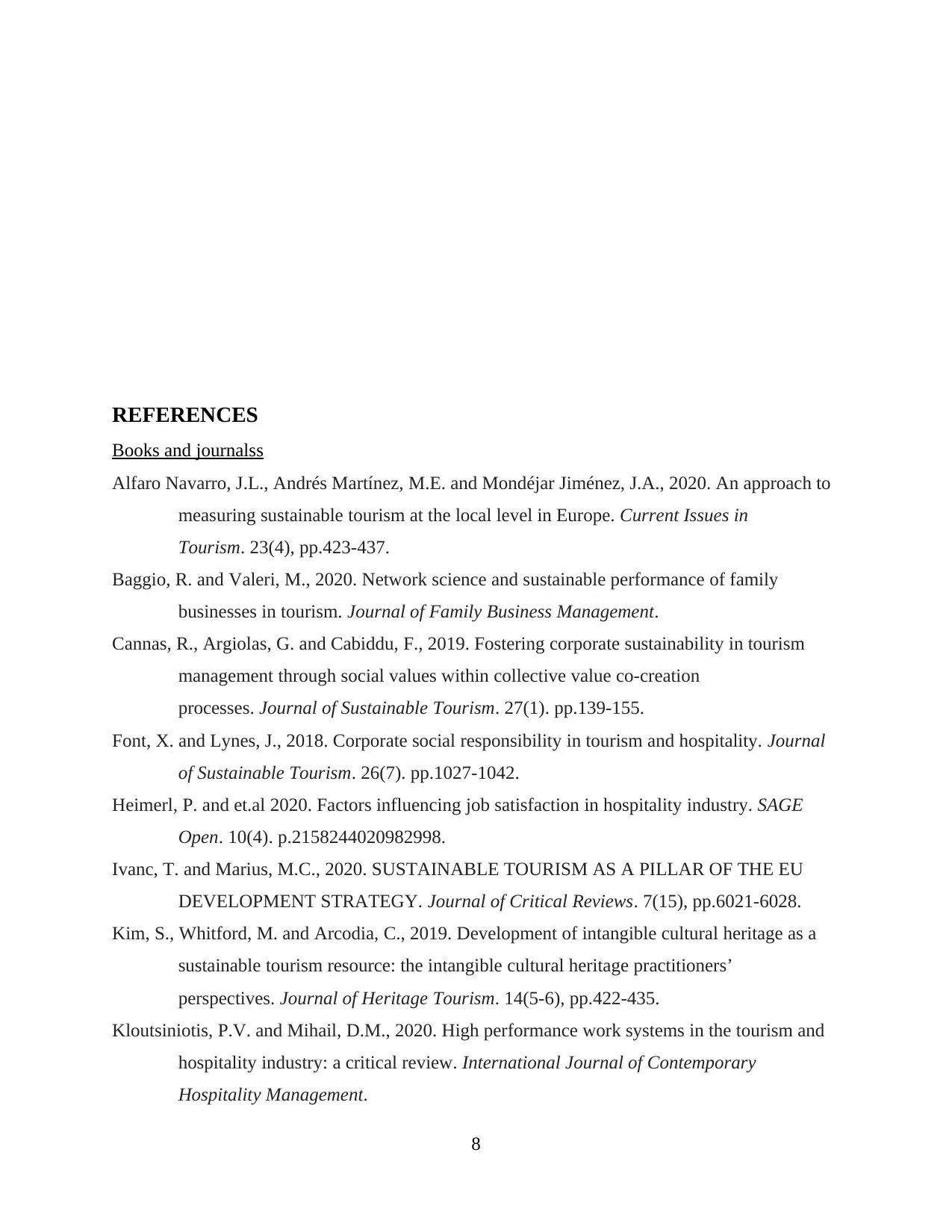
REFERENCES
Books and journalss
Alfaro Navarro, J.L., Andrés Martínez, M.E. and Mondéjar Jiménez, J.A., 2020. An approach to
measuring sustainable tourism at the local level in Europe. Current Issues in
Tourism. 23(4), pp.423-437.
Baggio, R. and Valeri, M., 2020. Network science and sustainable performance of family
businesses in tourism. Journal of Family Business Management.
Cannas, R., Argiolas, G. and Cabiddu, F., 2019. Fostering corporate sustainability in tourism
management through social values within collective value co-creation
processes. Journal of Sustainable Tourism. 27(1). pp.139-155.
Font, X. and Lynes, J., 2018. Corporate social responsibility in tourism and hospitality. Journal
of Sustainable Tourism. 26(7). pp.1027-1042.
Heimerl, P. and et.al 2020. Factors influencing job satisfaction in hospitality industry. SAGE
Open. 10(4). p.2158244020982998.
Ivanc, T. and Marius, M.C., 2020. SUSTAINABLE TOURISM AS A PILLAR OF THE EU
DEVELOPMENT STRATEGY. Journal of Critical Reviews. 7(15), pp.6021-6028.
Kim, S., Whitford, M. and Arcodia, C., 2019. Development of intangible cultural heritage as a
sustainable tourism resource: the intangible cultural heritage practitioners’
perspectives. Journal of Heritage Tourism. 14(5-6), pp.422-435.
Kloutsiniotis, P.V. and Mihail, D.M., 2020. High performance work systems in the tourism and
hospitality industry: a critical review. International Journal of Contemporary
Hospitality Management.
8
Books and journalss
Alfaro Navarro, J.L., Andrés Martínez, M.E. and Mondéjar Jiménez, J.A., 2020. An approach to
measuring sustainable tourism at the local level in Europe. Current Issues in
Tourism. 23(4), pp.423-437.
Baggio, R. and Valeri, M., 2020. Network science and sustainable performance of family
businesses in tourism. Journal of Family Business Management.
Cannas, R., Argiolas, G. and Cabiddu, F., 2019. Fostering corporate sustainability in tourism
management through social values within collective value co-creation
processes. Journal of Sustainable Tourism. 27(1). pp.139-155.
Font, X. and Lynes, J., 2018. Corporate social responsibility in tourism and hospitality. Journal
of Sustainable Tourism. 26(7). pp.1027-1042.
Heimerl, P. and et.al 2020. Factors influencing job satisfaction in hospitality industry. SAGE
Open. 10(4). p.2158244020982998.
Ivanc, T. and Marius, M.C., 2020. SUSTAINABLE TOURISM AS A PILLAR OF THE EU
DEVELOPMENT STRATEGY. Journal of Critical Reviews. 7(15), pp.6021-6028.
Kim, S., Whitford, M. and Arcodia, C., 2019. Development of intangible cultural heritage as a
sustainable tourism resource: the intangible cultural heritage practitioners’
perspectives. Journal of Heritage Tourism. 14(5-6), pp.422-435.
Kloutsiniotis, P.V. and Mihail, D.M., 2020. High performance work systems in the tourism and
hospitality industry: a critical review. International Journal of Contemporary
Hospitality Management.
8
⊘ This is a preview!⊘
Do you want full access?
Subscribe today to unlock all pages.

Trusted by 1+ million students worldwide
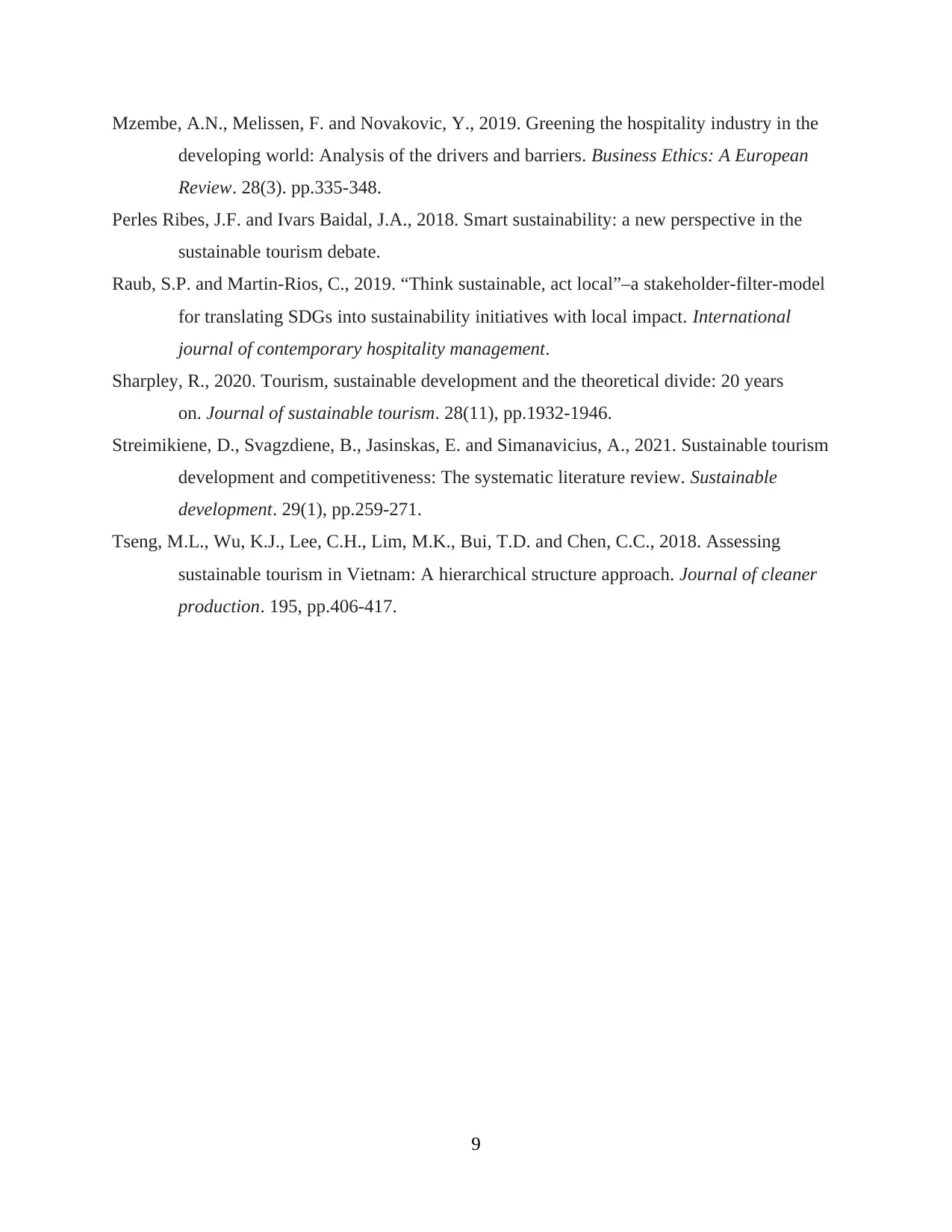
Mzembe, A.N., Melissen, F. and Novakovic, Y., 2019. Greening the hospitality industry in the
developing world: Analysis of the drivers and barriers. Business Ethics: A European
Review. 28(3). pp.335-348.
Perles Ribes, J.F. and Ivars Baidal, J.A., 2018. Smart sustainability: a new perspective in the
sustainable tourism debate.
Raub, S.P. and Martin-Rios, C., 2019. “Think sustainable, act local”–a stakeholder-filter-model
for translating SDGs into sustainability initiatives with local impact. International
journal of contemporary hospitality management.
Sharpley, R., 2020. Tourism, sustainable development and the theoretical divide: 20 years
on. Journal of sustainable tourism. 28(11), pp.1932-1946.
Streimikiene, D., Svagzdiene, B., Jasinskas, E. and Simanavicius, A., 2021. Sustainable tourism
development and competitiveness: The systematic literature review. Sustainable
development. 29(1), pp.259-271.
Tseng, M.L., Wu, K.J., Lee, C.H., Lim, M.K., Bui, T.D. and Chen, C.C., 2018. Assessing
sustainable tourism in Vietnam: A hierarchical structure approach. Journal of cleaner
production. 195, pp.406-417.
9
developing world: Analysis of the drivers and barriers. Business Ethics: A European
Review. 28(3). pp.335-348.
Perles Ribes, J.F. and Ivars Baidal, J.A., 2018. Smart sustainability: a new perspective in the
sustainable tourism debate.
Raub, S.P. and Martin-Rios, C., 2019. “Think sustainable, act local”–a stakeholder-filter-model
for translating SDGs into sustainability initiatives with local impact. International
journal of contemporary hospitality management.
Sharpley, R., 2020. Tourism, sustainable development and the theoretical divide: 20 years
on. Journal of sustainable tourism. 28(11), pp.1932-1946.
Streimikiene, D., Svagzdiene, B., Jasinskas, E. and Simanavicius, A., 2021. Sustainable tourism
development and competitiveness: The systematic literature review. Sustainable
development. 29(1), pp.259-271.
Tseng, M.L., Wu, K.J., Lee, C.H., Lim, M.K., Bui, T.D. and Chen, C.C., 2018. Assessing
sustainable tourism in Vietnam: A hierarchical structure approach. Journal of cleaner
production. 195, pp.406-417.
9
1 out of 10
Related Documents
Your All-in-One AI-Powered Toolkit for Academic Success.
+13062052269
info@desklib.com
Available 24*7 on WhatsApp / Email
![[object Object]](/_next/static/media/star-bottom.7253800d.svg)
Unlock your academic potential
Copyright © 2020–2025 A2Z Services. All Rights Reserved. Developed and managed by ZUCOL.




